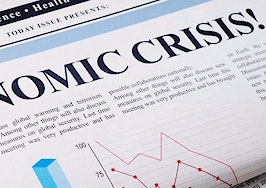Congress on Tuesday passed reforms to the Dodd-Frank Act, the massive financial reform bill enacted under President Obama in the wake of the 2008 crisis, a move that could have a serious impact on the real estate and mortgage lending sectors. Economists told Inman the rollback of the Dodd-Frank regulations could lend a hand toward partially solving the industry’s inventory crisis — but there are some potential landmines.
Small- and medium-sized banks — those with assets under $250 billion — will no longer be subject to so-called “stress tests” designed to gauge how well institutions fare under financial pressure, which Dodd-Frank regulations now require them to undergo. Looser restrictions, meanwhile, could fuel more small-scale construction loans, economists told Inman.
“This is a win for the financial industry,” said Redfin Chief Economist Nela Richardson, who worked on the bill as an economist for the Commodity Futures Trading Commission. “These are community banks, credit unions, a lot of them are in rural areas. They do a lot of mortgage lending. This will help consumers in that the banks will be able to free up some credit.”
National Association of Realtors Chief Economist Lawrence Yun echoed Richardson, adding that a loosening of Dodd-Frank rules may lead to a rise in regional construction.
“The regulations placed on small-size community banks were terrible because it hindered small-sized homebuilders from obtaining construction loans,” he said. “As the homebuilding industry has become more dominated by large corporations, now we have this relief, which means that, small-time homebuilders will have better access to capital to build homes.”
One provision of the bill, however, will exclude some of these lending institutions from including disclosure requirements laid out in the 43-year-old Home Mortgage Disclosure Act, which was also updated by Dodd-Frank. With prices high and credit tight, Richardson said it’s a time to be especially vigilant over lending practices that could lead to discrimination.
“The risk is to racial inequity, not systemic risk,” Richardson said. “That’s problematic. If we don’t measure what’s going on, if we’re not measuring and quantifying who is getting loans in this country, then we are at risk of returning to some very nasty practices of discrimination. For me, having that data to keep track on mortgage lending is crucially important.”
Economists seem to agree, however, that the economy is not on track to repeat the financial crisis of 2008, since big banks were at the center of the collapse a decade ago. Richardson explained that the only way to eliminate all risk is to make everything as onerous as possible.
“You can wring out all the risk in the system, but what if you have is a very dry cow — you have no lending and no credit access,” she said. “Risk is a part of finance. If we want banks to be innovative and we want credit access, we have to have risk.”
Matthew Gardner, chief economist at Windermere Real Estate, admitted that while he’s generally in support of reform, he’s worried about the provision that allows banks whose assets are under $10 billion to ignore the Volcker Rule, which will allow them to make speculative investments with the customers’ money — which is insured by the federal government.
“That’s a scary thing because as much as you say, ‘These are small banks and credit unions; they can’t affect the country,’ you know what? They can, and they did back in the 1980s,” said Gardner, citing the 1980-1981 recession, which saw many small banks fail.
The legislation will also require Fannie Mae and Freddie Mac to consider the use of alternative credit scoring models, which could help borrowers with thin credit files receive a mortgage. But Gardner said he’s concerned, ultimately, that we need to be cognizant of looser credit restrictions so the country does not repeat the acts of the last financial crisis, where homeowners were being given loans they could not pay back.
Selma Hepp, chief economist at Pacific Union International, doesn’t believe Dodd-Frank reform will immediately have too much of an impact on the housing market.
“With interest rates going up and affordability being pressured again, I think it may open the credit box a little bit,” she said. “Is it going to scratch the surface? I don’t think so.”













